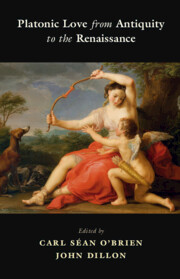Book contents
- Platonic Love from Antiquity to the Renaissance
- Platonic Love from Antiquity to the Renaissance
- Copyright page
- Contents
- Acknowledgements
- Notes on Contributors
- Introduction
- Part I Love in Plato
- Part II Development of Platonic Love in Antiquity
- Part III Love and Metaphysics during the Middle Ages
- Chapter 9 Divine Love and Platonic Beauty in Dionysius the Areopagite
- Chapter 10 Love in the Thought of John Scotus Eriugena
- Chapter 11 Thomas Aquinas on the Connatural, the Supernatural, Love and Charity
- Part IV Platonic Love during the Renaissance
- Bibliography
- Subject Index
- Index Locorum
Chapter 10 - Love in the Thought of John Scotus Eriugena
from Part III - Love and Metaphysics during the Middle Ages
Published online by Cambridge University Press: 25 August 2022
- Platonic Love from Antiquity to the Renaissance
- Platonic Love from Antiquity to the Renaissance
- Copyright page
- Contents
- Acknowledgements
- Notes on Contributors
- Introduction
- Part I Love in Plato
- Part II Development of Platonic Love in Antiquity
- Part III Love and Metaphysics during the Middle Ages
- Chapter 9 Divine Love and Platonic Beauty in Dionysius the Areopagite
- Chapter 10 Love in the Thought of John Scotus Eriugena
- Chapter 11 Thomas Aquinas on the Connatural, the Supernatural, Love and Charity
- Part IV Platonic Love during the Renaissance
- Bibliography
- Subject Index
- Index Locorum
Summary
Eriugena’s concept of love seems to be twofold. On the one hand, he adopts the Platonic concept of love (ἔρως). It is well known that the Platonic eros stands ‘between’ the lover and the loved. Of course, its function is anagogic but, therefore, eros, as a mediator, cannot be conceived of as God himself. On the other hand, Eriugena states that the Absolute loves itself. To be sure, God’s self-referential love is not egoistic but caritative, soteriological and eschatological. It is the outcome, in short, of divine providence (ἀγάπη). Eriugena follows Pseudo-Dionysius the Areopagite, his most important intellectual precursor, and combines both concepts of love. But how, we must ask, can he combine both concepts? How can these two different concepts become one? Or is their difference only an apparent one? We shall answer these crucial questions by considering the two most important concepts of Eriugena’s metaphysics: the transcendence and immanence of the Absolute, or God. Thinkers tend to put these terms in diametrical opposition, but this view, besides leading to confusion, is fundamentally mistaken.
- Type
- Chapter
- Information
- Platonic Love from Antiquity to the Renaissance , pp. 171 - 183Publisher: Cambridge University PressPrint publication year: 2022
- 1
- Cited by

